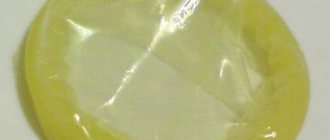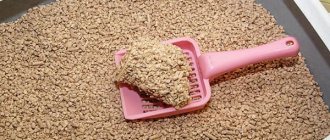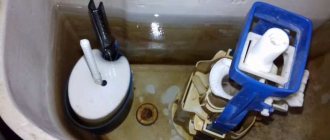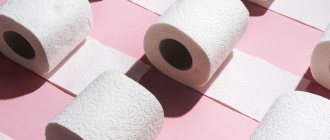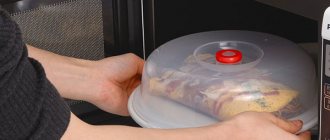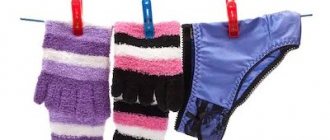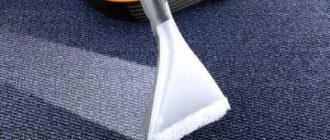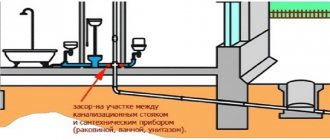Everyone knows what a toilet is for. But the idea of using it as a garbage disposal does not leave the minds of housewives - they often ask what can be thrown into the toilet. For example, it would be very convenient to flush condoms, cat litter, napkins, and toilet paper. In fact, using it for other purposes is dangerous, and the list of items that you can get rid of this way is small. Many materials can cause clogs and even burst pipes. Let's figure out how to handle the toilet correctly and safely.
Myth 2. After washing the floors, it is better to flush the water down the toilet.
Dirty water after washing floors can “feed” future clogs.
Hair and animal fur clump and over time clog the pipes so that even cleaning with a cable will not help. Therefore, it is advisable to remove large clumps by hand before throwing the contents of the bucket into the toilet, suggests plumber Evgeniy Anisimov. Hair ends up in the drain not only when cleaning. We often remove them from combs, brushes or drain filters and automatically throw them into the toilet. The same applies to dry cleaning. It is better to place all solid waste collected with a rag or broom in the trash can rather than in the toilet.
A quick way to clean a drain with boiling water
The method suggests clearing the clog using boiling water. Boil a bucket of water. Pour its contents into the toilet at a right angle, working as quickly as possible. If the water begins to drain slowly, you should repeat the procedure several more times. Such simple actions can rid the sewer of simple blockages.
Attention! Do not use boiling water under any circumstances if your toilet is equipped with a connecting corrugation made of thin plastic. If you need to flush, you can use hot water in this case.
Myth 3. Cigarette butts, matches and coals will quickly disintegrate in the sewer.
No cigarette butts, matches, or hookah coals should be placed in the toilet. Firstly, activated sludge in treatment facilities will not break them down - it only copes with human waste. Secondly, they won’t even reach the purifiers themselves, but will settle on the filtration grates or clog the sewer pipes.
Plumbers warn that coals appear deceptively fragile, but can easily cause clogs. Matches, even under ideal conditions, will take several months or even years to completely decompose. And cigarettes usually contain filters made of acetate and other artificial materials, so they do not decompose at all.
Chemical cleaning
People have long been accustomed to using ready-made solutions in all areas of their lives, and manufacturers are successfully using this. Household chemicals stores offer a fairly wide selection of specialized products for cleaning pipes and toilets. They are available in the form of liquids, gels, powders and granules. There may be disposable packaging and large containers designed for several times. These products cope excellently with the problem, while also performing a number of other functions: Disinfect the plumbing fixtures to be cleaned. Eliminates unpleasant odors from sewer pipes. Keep pipes clean. Have a preventive effect. The most common brands:
- Tiret. Mole.
- Domestos.
- Tofix.
- Domol.
Myth 4. Oil will “slip” through the pipes along with water
The English term fatberg, or fatberg, very accurately describes what happens to oil in the sewer. It hardens, mixes with debris and turns into huge rock growths on the walls of the system. Thus, greasy waste can clog the entire city sewer system.
Therefore, the oil from the dishes should be collected with a napkin and thrown into the trash. If there is a lot of oil waste, it is better to pour it into a separate container, close it tightly and put it in a trash container, recommends plumber Evgeniy Anisimov.
If you have a lot of used technical or cooking oil, you can even sell it.
Igor Sidorov plumber
5,0 38
Open profile
Oil burns well, so sometimes it is used to heat industrial premises. If you don't have an oil boiler or a special furnace, look for advertisements for buying used oil on the Internet and get rid of it that way.
Experts also advise not to wait for problems to appear, but to periodically carry out preventative measures—preferably with the help of a professional.
Anton Malakhaev plumber
4,95 64
Open profile
To prevent fatty build-ups in pipes, you can flush the sewer system with boiling water, and to remove blockages, use alkali - caustic soda, as it effectively dissolves organic fats.
We use a plunger
Almost every housewife has this device. They clean not only toilets, but also bathrooms and sinks. How does it work?
Using a plunger, you need to create conditions in the pipes for water hammer. It is he who must dislodge the blockage, which will then be broken into components and washed into the sewer.
You need to take it in your hands and place the rubber part against the toilet drain hole. After this, you need to press hard on it several times. This is how you will be able to achieve your goal. After some work with the fixture, you need to turn on the flush.
Read on topic: How to use a plunger
Myth 5. Any paper will sooner or later dissolve in water
In theory, flushable bushings can indeed go down the toilet, but plumbers do not agree with this.
Anton Malakhaev plumber
4,95 64
Open profile
Multilayer cellulose does not dissolve completely. Paper particles stick to the walls of the pipes and create an obstacle to the flow of water. If the house has old pipes made of cast iron or PVC, which already have roughness and build-up, then the likelihood of paper blockage is even higher.
For the same reason, master Evgeniy Anisimov does not recommend rinsing paper towels. Some pipes can let them through, but for some, dense cellulose will be fatal. It's better to get into the habit of always throwing them in the trash.
Wet wipes and toilet paper do not dissolve in water. They are made of synthetic material and are closer in composition to plastic bags, so you only need to throw them in the trash. The fatbergs we wrote about above grow precisely because of excess cooking oil and wet wipes. The same applies to cosmetic fabric face masks.
Cotton pads, tampons, bandages, pads, cotton swabs - all these things also contain dense cellulose and plastic and therefore should be disposed of only with household waste.
Plumbing cable for complex blockages
Such a device is a rare guest in ordinary apartments, because it is considered a professional tool for plumbers. But if, fortunately, one is still present, then you need to attach a sharp nozzle or a piece of thick wire to one end of it (if necessary). This structure is immersed in the toilet until it stops and the handle is turned clockwise. The cable can reach even a very distant blockage, after which it is recommended to clean the system with one of the special products or use hot water for this.
Use a cable if nothing else works.
Why soak toilet paper in vinegar?
Soak toilet paper in vinegar: it will solve many problems around the house! People have been using vinegar as an economical solution to cleaning various surfaces since ancient times.
According to scientists, if you soak a roll of toilet paper in vinegar and then wipe the dirty surface with it, you can solve this problem thanks to the amazing disinfecting properties of the product.
Myth 6. Expired medications and cosmetics are best flushed down the toilet.
Antidepressants, painkillers, antibiotics, contraceptives and other potent drugs pollute wastewater and are not always neutralized at treatment plants. As a result, water with dissolved drugs is sent to open water bodies, where it harms the ecosystem. This is how more resistant, antibiotic-resistant bacteria appear.
Creams and balms usually contain fats and other ingredients that should not end up down the drain. Therefore, it is better to throw cosmetics and expired and unnecessary medications into the trash bin “as is”. You should also dispose of contact lenses and dental floss.
If the expiration dates and integrity of the packaging are in order, you can share them in drug and cosmetics exchange groups on social networks and thus help those who need them. This method is only suitable for over-the-counter medications.
Dental floss
Don't throw used dental floss into the toilet. By itself it will not create congestion. However, due to its large length and fibrous structure, it can become entangled and form a kind of network that will begin to trap increasingly larger elements that are washed away with water. In a septic tank drain, it can wrap around the system motor and cause serious damage.
On the other hand, dental floss is made from synthetics. This material does not decompose for a long time. Once through the sewer, the fibers will cause harm to the environment. They clog the soil and enter the stomachs of small animals, leading to their death.
Myth 7. Cat litter can be put into a regular toilet.
The name "cat litter" is misleading. The filler in it is usually synthetic - it swells easily and can instantly clog the drain. But even natural wood filler cannot be thrown into the toilet - it breaks down into sawdust, which also clogs the pipes.
You need to try to separate the feces from the soiled litter as much as possible with a scoop and throw the first into the toilet, and the second into the trash. This procedure will take a couple of seconds, but will save nerves and money on calling a plumber.
Fish
Aquarium fish, as well as amphibians and reptiles, do not last forever. Many owners slowly flush dead carcasses down the toilet. Occasionally, live pets are also sent there. In Canada, authorities are asking citizens not to flush fish down the toilet, as they manage to swim to bodies of water and can displace local fauna in them.
In Australia, there is concern that exotic aquarium species spread various diseases when released into the natural environment. Sometimes tired or sick fish are sent from the aquarium directly to a pond or river. The correct way to put such animals to rest is a trip to the veterinarian or burial in a compost heap.
Myth 8. If you accidentally washed off something wrong, it is better to immediately call a specialist
Anton Malakhaev explains that there is no need to panic: sewer pipes in normal condition will “swallow” small debris, and then it will be retained by special grates. From there it is regularly removed, crushed and taken to a solid waste landfill, so it usually does not end up in wastewater treatment plants.
But especially cigarette butts, contraceptives, personal hygiene products and other small garbage should still not be thrown into the sewer. Especially if you don't know what condition your pipes are in. Blockages always happen unexpectedly. Plus, the cleaner our wastewater, the cleaner our tap water.
Contact lenses
Contact lenses do not serve their intended purpose for long; they are small and almost invisible. It would seem that they cannot do any harm if you simply flush a couple down the toilet. However, lenses are made from polymers that take a long time to degrade. They will continue to harm the environment for decades. Experts estimate that more than 20 tons of contact lenses are washed down the drain every year!
In this regard, some manufacturers have even launched a campaign to recycle used lenses. If you are a responsible person, then return your old lenses to collection points (if they exist in your country). Some manufacturers can send them by parcel for proper disposal.
Chlorine and chemistry based on it
Chlorine bleach is an excellent cleaning agent. However, bleach is so aggressive that it can damage pipes with frequent use. For a septic system, chlorine is completely destructive, as it quickly kills the bacteria responsible for processing waste. In addition, products with bleach severely damage the coating of the toilet itself, it loses its shine, turns yellow, and becomes loose. Instead, vinegar is quite suitable, as it perfectly removes organic odors.
Manufacturers: TOP-10
Today the leading positions are occupied by the following brands (places are distributed randomly):
- Zewa (Zeva).
- Sun and moon.
- Mon Rulon (Mon Roll).
- Economy Smart (Economy Smart).
- Kleenex (Kleenex).
- Aura (Aura).
- Every day from Auchan.
- Biocos (Biokos).
- Smile (Smile).
- Veiro (Veiro).
In stores you can also buy products from Pamperino, Vestar, Tolli, Fresh Idea, Ushasty Nyan and others.
The loud name “wet toilet paper” that jumps out at the buyer from the shelves of hardware stores is a marketing ploy. This product did not produce any revolution in the field of hygiene products. However, you can conduct an experiment yourself and try to use such material yourself, assessing all its advantages and disadvantages.
Hair
Although hair is a product of human activity and is not environmentally friendly, it is strictly forbidden to wash it off! Just like dental floss, human hair has the ability to form large clumps that clog sewer ducts, around which various debris, dirt, and grease stick, which is the source of foul odor from the sewer and toilet.
After combing or cutting, gather the hair into a ball and throw it in a trash bin or, better yet, burn it in a fire. Some people believe that it is wrong to throw hair into the trash bin, since there is a sympathetic connection between the hair and its owner. Hair is used for love spells and spells by all kinds of fortune tellers and sorcerers.
Can I have tampons?
In order to understand whether tampons can be flushed down the toilet, you need to pay attention to their composition. Modern tampons are a mixture of regular cotton wool, fibers and absorbent material.
Some of them are made cylindrical by inserting a strong thin rope inside. For convenience, others use an applicator made of two tubes. They are also distinguished by size, depending on the intensity of a woman’s menstruation.
- Mini
- Normal
- Super
- Super plus
When the tampon consists of soluble cellulose and is small in size, it can be washed off according to its instructions. You can also wash off tampons made from soluble cardboard and other soluble materials, as indicated in the instructions.
Cat excrement
Sewage is designed to dispose of waste from living creatures, which includes cats. From this point of view, everything is correct, provided that the owner uses a special scoop with a grid to sift out the filler. However, often the pellets are washed out of the litter box along with the cat's excrement.
Some owners also send crumpled wet litter this way. In water, the granules harden, clump into large pieces and form a plug in the pipes. It is better to throw the litter along with solid waste into a waste bin. By the way, this manufacturer’s recommendation is on most packages.
Customer Reviews
Most buyers who tried impregnated toilet paper were left perplexed. They didn't notice much difference between it and a similar product (wet wipes). This product is certainly convenient, you can take it with you on trips or to the hospital, where it is not possible to fully wash yourself, but ordinary baby wipes often have all the same functions, so reviews of these products are more neutral than positive or negative .
However, those who have previously used only regular toilet paper note a better feeling of cleanliness and freshness.
